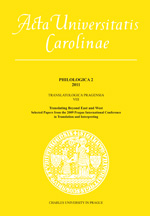Historical Specificity Versus Universal Applicability in Translation Studies
Historical Specificity Versus Universal Applicability in Translation Studies
Author(s): James St. AndréSubject(s): Language and Literature Studies
Published by: Univerzita Karlova v Praze, Nakladatelství Karolinum
Summary/Abstract: Since the 1980s, universalism has come under attack in a wide variety of disciplines in the humanities and social sciences. Among other factors, the rise of post-structuralism and its distrust of master narratives, the emergence of New Historicism and Cultural Materialism with their emphasis on the historical situatedness of knowledge, and deconstruction’s relentless dismantling of western philosophical traditions have all contributed to this trend. At the same time, the search for universals in both linguistics and in translation studies has been given renewed life through the use of corpus-based studies since the 1990s. The current paper explores to what extent it may be possible, or desirable, to identify rules of universal applicability in translation studies by discussing the intersection of historically specific data and theoretical models. Toward this end, the author discusses four inter-related phenomena. First, he looks at the (non-)translation of translation theory West to East, East to West; second, he discusses the importance of examples and case studies in translation theory; third, he discusses the importance of Western religious belief as philosophical grounding for universalism; and finally, he tries to balance the claims of New Historicism with computational linguistics to show how recent claims for universals in translation studies are qualitatively different from an earlier generation of such claims.
Journal: Acta Universitatis Carolinae Philologica
- Issue Year: 2011
- Issue No: 2
- Page Range: 9-25
- Page Count: 17
- Language: English

